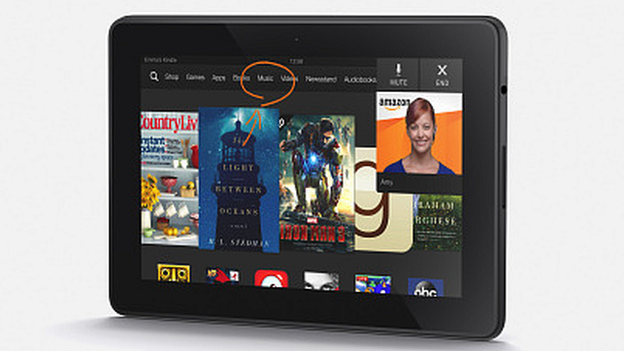Amazon Fire Phone offers 3D views and gesture controls
- Published
WATCH: BBC's Richard Taylor tries out Amazon's Fire Phone
Amazon has unveiled its first handset, offering 3D visuals - thanks to four face-tracking cameras on its front - and gesture controls.
The Fire Phone allows its user to change an image's perspective by moving their head, rather than creating "pop-out" effects.
The owner can also scroll through a webpage or bring up menus by tilting the smartphone in their hand.
Chief executive Jeff Bezos announced the phone at a press event in Seattle.
One industry watcher had doubts about what was on show.
"We've seen similar gesture controls on Samsung's Galaxy range, and not many people use them," said Francisco Jeronimo, a mobile devices analyst at market research firm IDC.
"Unless the experience is extraordinary it can come across as a gimmick. I'd be surprised if Amazon has succeeded when Samsung hasn't, but I'll need to try it.
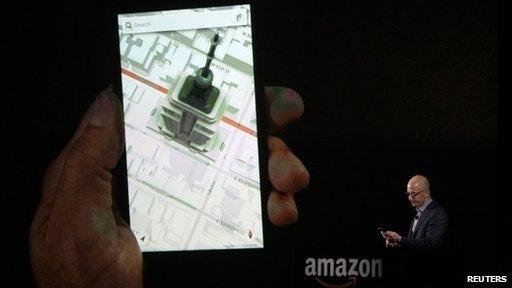
Mr Bezos showed how the "dynamic perspective" effect could be used to help navigate maps by looking around the side of landmarks
The launch comes at a time when Amazon's tablet sales appear to be on the wane, despite recent price promotions.
Mobile content
The basic version of the Fire Phone, with 32 gigabytes (GB) of storage, will cost $199 (£117) on top of a two-year contract with AT&T - the only network to offer it initially - on 25 July.
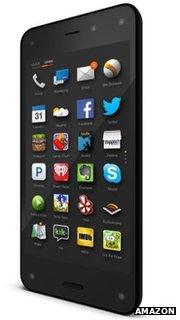
Amazon says its app store tripled in size over the past year
That is the same price AT&T charges for the 16GB versions of Apple's iPhone 5S and Samsung's Galaxy S5.
The "dynamic perspective" effect is made possible by the inclusion of four "ultra-low power" cameras coupled with four infrared LEDs, which permit the device to keep tracking the position of the user's eyes and mouth in the dark.
The process only requires two cameras, but the firm said the extra two meant users would not need to worry how they held the handset.
Mr Bezos gave the example of looking at a dress' design from different angles as an example of how the effect could be used, and showed how a handset could be tilted afterwards to make it move onto another garment.
Another innovation introduced by the Fire Phone is a dedicated side-button to activate Firefly, an app that allows it recognise text, images and sound in the smartphone's immediate vicinity.
It can be used to bring up information - for example details of a wine, the name of a song, or information about a painting - and when relevant, the chance to buy the same or a related product from Amazon.
The facility relies on Amazon's computer servers, so will not be available when the phone is offline.
"Firefly is not just about taking you back to the Amazon store, it's about knowing so much more about consumers - things Amazon would not have known before," noted Carolina Milanesi, from research firm Kantar Worldpanel Comtech.
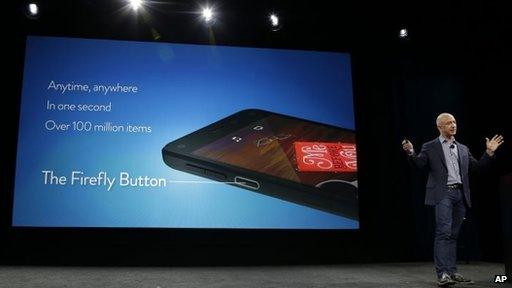
The Firefly facility could encourage owners to make impulse purchases from Amazon
The device also takes advantage of several other online services the company offers, including:
Mayday - the ability to call up an Amazon adviser via a video feed, with a promise of a response within 15 seconds
ASAP - a facility that pre-loads video content to the phone from the firm's Prime Instant Video collection, basing its choices on the user's past viewing behaviour
Cloud Drive - the firm's internet based storage facility, which is being used to offer "unlimited" space for the photos it takes
Prime Music - access to more than a million songs that can be downloaded or streamed, although new releases are not included
Several of these services will only remain available if the owner renews their Amazon Prime membership after a year, at an annual cost of $99.

Analysis: Richard Taylor, North America technology correspondent
Amazon promised us something "a little bit different" - and on that front Jeff Bezos has delivered with a phone with a "wow factor" sporting several differentiators.
Sure, established phone makers LG and HTC had 3D displays back in 2011, but they used filters on top of the screen, a far cry from the "dynamic perspective" take on 3D Amazon is bringing us here.
The Firefly object recognition might prove more immediately useful for many users, and for Amazon itself, providing yet another virtually seamless route for purchases to be made through the retailer itself.
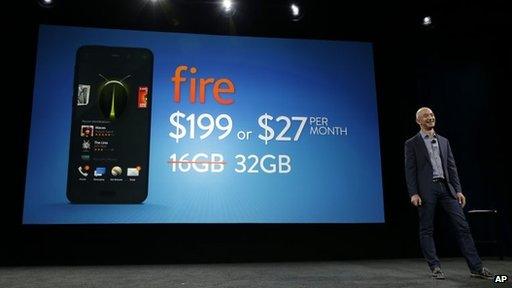
The basic Fire Phone offers more storage than the entry-level iPhone 5S and Galaxy S5, but its included Prime subscription only lasts for one year
Yet despite these unique features, Mr Bezos is treading into territory where other more established tech names have stumbled.
Amazon's recent foray into tablets has barely made a dent in the Apple-Samsung duopoly.
Consumers also do not appear to have warmed to Amazon's own software, a "forked" version of Google Android.
Its own app store may have some 240,000 apps, but many are poorly-rated third-party versions of popular apps found in Google Play, which has more than 1.2 million apps.
Even so, Amazon's offer of 12 months of free membership to its Prime services - including fast free deliveries of physical goods - will undoubtedly help this handset gain market traction, especially amongst price-sensitive customers.
And for those that do buy the Fire Phone, it will undoubtedly create a "halo effect" on the rest of Amazon's businesses; the big unknown is just how far it will stretch.

Crowded market
Amazon shipped one million Kindle Fire-branded devices in the first three months of this year, down from 1.8 million the same period in 2013, according to IDC, external.
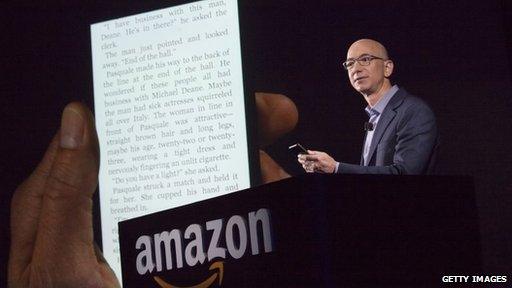
The Fire Phone can scroll through documents by being tilted up and down
Its data indicates that Amazon's market share of the tablet sector now stands at 1.9%, about half what it was a year ago.
The handset market is an even more crowded space with several existing manufacturers failing to profit from the hardware they sell.
But with the number of global smartphone users approaching the two billion-mark, grabbing even a small fraction of the market could still prove valuable to the US firm.
"Most of the value Amazon will accrue from these handsets will be made over the following years after the initial sale," said Chris Green, principal technology analyst at the Davies Murphy Group consultancy.
"That's partly selling you follow-up annual subscriptions to its Prime services after the first 12 months.
"But it's also about one-off purchases such as paying for the rental of a movie that's not included in the subscription package and also buying apps from it store.
"I wouldn't say Amazon has tied everything together as well as Apple, but it's certainly done it much better than Google."
- Published19 June 2014
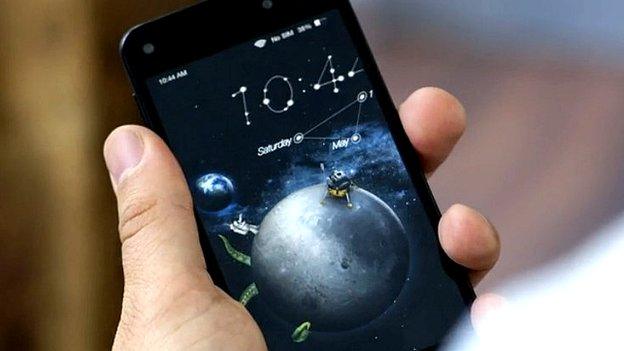
- Published18 June 2014
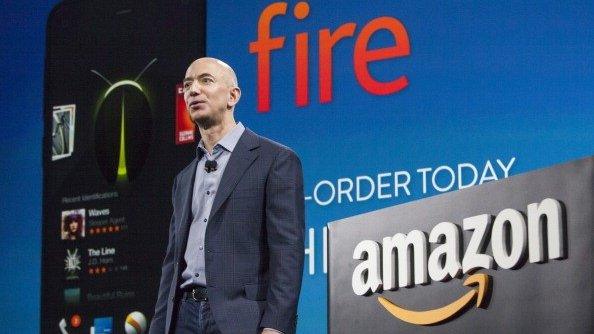
- Published18 June 2014
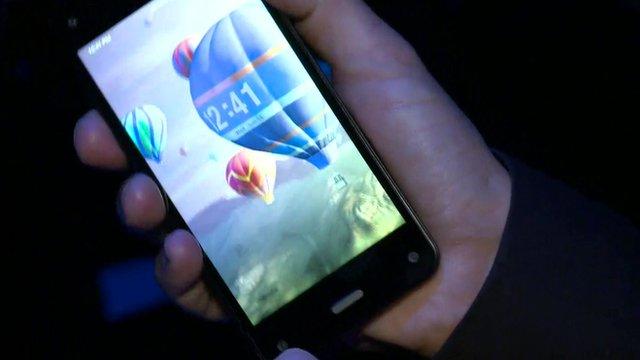
- Published12 June 2014

- Published11 June 2014

- Published2 April 2014
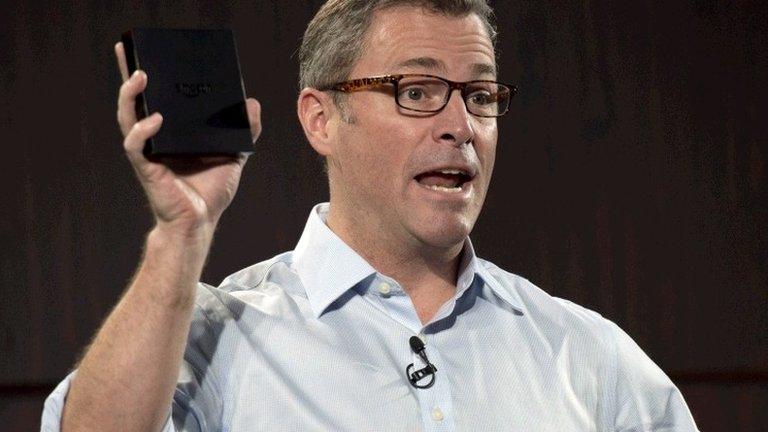
- Published25 September 2013
